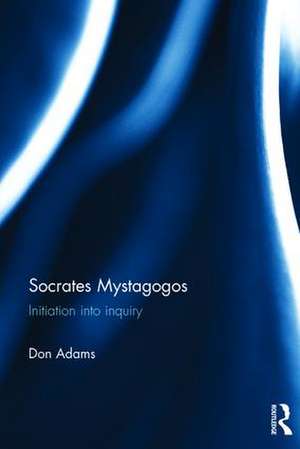Socrates Mystagogos: Initiation into inquiry
Autor Don Adamsen Limba Engleză Hardback – noi 2016
| Toate formatele și edițiile | Preț | Express |
|---|---|---|
| Paperback (1) | 257.25 lei 6-8 săpt. | |
| Taylor & Francis – 30 iun 2020 | 257.25 lei 6-8 săpt. | |
| Hardback (1) | 819.99 lei 6-8 săpt. | |
| Taylor & Francis – noi 2016 | 819.99 lei 6-8 săpt. |
Preț: 819.99 lei
Preț vechi: 1178.21 lei
-30% Nou
Puncte Express: 1230
Preț estimativ în valută:
156.90€ • 170.97$ • 132.22£
156.90€ • 170.97$ • 132.22£
Carte tipărită la comandă
Livrare economică 23 aprilie-07 mai
Preluare comenzi: 021 569.72.76
Specificații
ISBN-13: 9781472484833
ISBN-10: 1472484835
Pagini: 200
Dimensiuni: 156 x 234 x 18 mm
Greutate: 0.46 kg
Ediția:1
Editura: Taylor & Francis
Colecția Routledge
Locul publicării:Oxford, United Kingdom
ISBN-10: 1472484835
Pagini: 200
Dimensiuni: 156 x 234 x 18 mm
Greutate: 0.46 kg
Ediția:1
Editura: Taylor & Francis
Colecția Routledge
Locul publicării:Oxford, United Kingdom
Cuprins
Preface
Introduction
Chapter 1: Socratic Skepticism
Introduction
Section 1: Subversive and Unversive Transgression in Comedy
Section 2: Unversive Transgression in Greek Cult Festivals
Section 3: Aristophanic Conservatism, Socratic Liberalism
Section 4: The Causality of Humor
Section 5: Introducing Socrates Mystagogos
Conclusion
Chapter 2: Socratic Epistemology
Introduction
Section 1: "The Socratic Fallacy" Refuted
Section 2: "The Socratic Fallacy" Revived
Section 3: Socratic Dogmatism
Section 4: Socratic Refutation
Section 5: Socratic "Folk Epistemology"
Section 6: Refutation, Induction, and the Use of Examples
Section 7: "The Socratic Fallacy," Again
Conclusion
Chapter 3: Socratic Method
Introduction
Section 1: "The Problem" of the Socratic Method
Section 2: Why Socrates’ Refutations are Reasonable
Section 3: Interpretive Misconceptions
Section 4: What Guarantee does Socrates have that he is right?
Conclusion
Chapter 4: Socratic Piety
Introduction
Section 1: Socrates the Anti-Authoritarian?
Section 2: Two Theories of Civil Disobedience
Section 3: Politico-Epistemic Humility in the Apology
Section 4: Politico-Epistemic Humility in the Crito
Conclusion
Conclusion
Section 1: Socrates Mystagogos
Section 2: Socrates and Martin Luther King
List of References
General Index
Index Locorum
Introduction
Chapter 1: Socratic Skepticism
Introduction
Section 1: Subversive and Unversive Transgression in Comedy
Section 2: Unversive Transgression in Greek Cult Festivals
Section 3: Aristophanic Conservatism, Socratic Liberalism
Section 4: The Causality of Humor
Section 5: Introducing Socrates Mystagogos
Conclusion
Chapter 2: Socratic Epistemology
Introduction
Section 1: "The Socratic Fallacy" Refuted
Section 2: "The Socratic Fallacy" Revived
Section 3: Socratic Dogmatism
Section 4: Socratic Refutation
Section 5: Socratic "Folk Epistemology"
Section 6: Refutation, Induction, and the Use of Examples
Section 7: "The Socratic Fallacy," Again
Conclusion
Chapter 3: Socratic Method
Introduction
Section 1: "The Problem" of the Socratic Method
Section 2: Why Socrates’ Refutations are Reasonable
Section 3: Interpretive Misconceptions
Section 4: What Guarantee does Socrates have that he is right?
Conclusion
Chapter 4: Socratic Piety
Introduction
Section 1: Socrates the Anti-Authoritarian?
Section 2: Two Theories of Civil Disobedience
Section 3: Politico-Epistemic Humility in the Apology
Section 4: Politico-Epistemic Humility in the Crito
Conclusion
Conclusion
Section 1: Socrates Mystagogos
Section 2: Socrates and Martin Luther King
List of References
General Index
Index Locorum
Recenzii
"How should we think about what Socrates is doing when he engages this or that youth in conversation? Don Adams’ book offers an answer to this question, inspired by an ancient Greek religious ritual: Socrates is on a mystagogic mission to sting his interlocutor into an epistemological state of inquiry ... Socrates Mystagogos: Initiation into Inquiry is a thought-provoking defense of Socratic practice that will be of interest to a mixed, if not quite well-defined, scholarly audience."
- Andreas Avgousti, Columbia University, USA, in the Bryn Mawr Classical Review, 2017
- Andreas Avgousti, Columbia University, USA, in the Bryn Mawr Classical Review, 2017
Descriere
For Socrates, philosophy is not like Christian conversion from error to truth, but rather it is like the pagan process whereby a young man is initiated into cult mysteries by a more experienced man – the mystagogos. In Greek cult religion, the mystagogos prepared the initiate for the esoteric mysteries revealed by the hierophant. Socrates treats traditional wisdom with skepticism, and this makes him appear ridiculous or dangerous in the eyes of cultural conservatives. Nevertheless, his skepticism is not radical: custom is not something on which we must turn our backs if we are to pursue the truth. Socrates assumes an epistemology and employs a method by which he induces his companions to begin the critical and self-critical process of philosophical inquiry, not ignoring conventional wisdom, but thinking through and reinterpreting it as they make constructive progress toward the truth.
